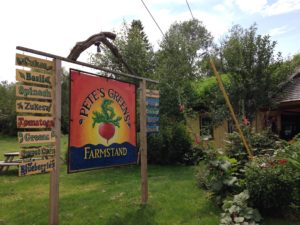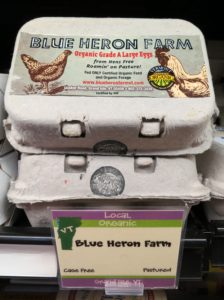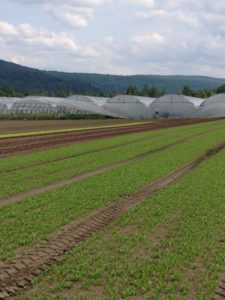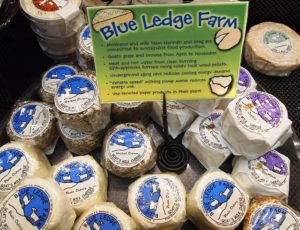Grocery Stores are Key to Expanding Local Food Systems
Local food is trending, but a regional food vision is what will re-localize our food system and agricultural economy—regional food that can be purchased at the grocery store
Farmers and food businesses operate at different scales and sell products to all types of markets. With more than 33 million potential customers in New England and New York, regional markets are increasingly important for statewide producers and processors. Broadening access to regional grocery stores, restaurants, and institutions is necessary to significantly expand markets for locally-grown products and increase farm profitability.

Pete’s Greens Farmstand in Craftsbury, Vermont contributes to direct sales figures. Photo by Rachel Carter
Pete’s Greens, a certified organic, four season vegetable farm located in Craftsbury, Vermont, is a 50% wholesale operation to restaurants and retail markets, mostly in Vermont, and is committed to getting food into Vermont grocery stores at prices Vermonters can afford. “Retail requires more land dedicated to certain fields for specific crops. Retail outlets like supermarkets are interested in local, organic produce, but they need a specific slot of one type of veggie for warehouse storage,” explains Amy Skelton, CSA Manager and a jack-of-all-trades at Pete’s Greens.
“Support is even stronger at the local level with small markets and independent grocery stores. Those store managers who get behind supporting local and take the risk are rewarded.”
“Stores and restaurants are near saturated in our area as we have a lot of growers that sell directly into these markets,” says Christa Alexander, farmer/owner of Jericho Settlers Farm. Located in Jericho Center, Vermont, Jericho Settlers Farm is a diversified, year round farm primarily providing CSA shares including vegetables, flowers, herbs, pork, grass-fed beef and lamb, chicken and eggs. They wholesale product to nearby restaurants and stores, and, to a lesser extent, a few schools and local hospital.
In order for markets to expand beyond the hyper-local to regional Christa suggests, “we need to increase produce pack/storage and distribution opportunities into the larger population hubs, possibly even processing hubs where multiple farms can bring raw product direct from the field to a wash/pack facility that cleans, grades, cools, packages, and distributes to larger population hubs.”
Amy Skelton adds, “More and more consumers want to do less food prep and they want convenient sized packages. It’s the value-added products and cleaned-up/prepped food that is going to sell. Additionally, technical assistance support for small producers is incredibly helpful for them to overcome systems issues so they can grow, hire specialists to help develop parts of their business, and pay good wages.”
The cycle of increasing processing and distribution infrastructures, expanding from local to regional, and increasing farm viability and business profitability by supporting producers so they can pay good wages (which helps decrease food insecurity) are all a part of the work taking place in Vermont to reach the goals of the Farm to Plate Strategic Plan: to grow Vermont’s farm and food economy and improve access to healthy local food for all Vermonters.
Vermont Farm to Plate program director, Erica Campbell states, “Grocery store owners and buyers are a part of a network of producers that farmers do not have relationships with as they did many years ago so there are multiple issues that need to be addressed to move more local food into grocery stores at a reasonable price. Farm to Plate is building a network of grocers and retailers, the grocers association, distributors and food hubs, producers, and regulators to build the relationships necessary to begin to make movement on this issue. Through our work thus far we have learned that technical assistance and support systems for retail stores are necessary for them to begin to make a shift in how and where they purchase food.”
The recently released 2012 Census of Agriculture included direct sales numbers which, in Vermont, seemed to level out with a $2 million increase from 2007, compared to a $13 million increase between 2002 and 2007. With a robust and growing farm and food economy—2200 full-time food system jobs with benefits have been added in Vermont since the start of Vermont’s Farm to Plate Initiative in 2009—the direct sales numbers show a solid 3.5% representation in Vermont food sales, giving farmers’ markets and CSAs a small, but consistent piece of the local food sales pie.
Of increasing interest to those who track data connected to the farm and food economy—like those at Vermont Farm to Plate—direct sales (while often thought of as the indicator of local food sales) do not account for the recent growth of local food sales in retail, wholesale, and institutional markets. With no system to track this growing part of the farm and food economy, direct sales numbers can no longer be equated to the growth of the local – or regional – food system.
Learn More
- Read more about Vermont retail and wholesale distribution in the Farm to Plate Strategic Plan and learn more about how Vermont is reaching the goals of Farm to Plate.
- Pete’s Greens, located in Craftsbury, VT sells organic produce both direct and wholesale and recently opened a new farm store in Waterbury.
- Jericho Settlers Farm, located in Jericho Center, VT, sells organic vegetables, grass fed meats, and eggs through their CSA and at local stores and restaurants.
- City Market is a community-owned food cooperative in Burlington, VT dedicated to supporting the local economy and enhancing the sustainability of agriculture.
- Hunger Mountain Co-op is a member-owned, cooperative committed to building a dynamic community of healthy individuals, sustainable local food systems, and thriving cooperative commerce.
Sodexo, the largest institutional food service provider in Vermont, recently implemented a local food tracking system and determined they are purchasing 15% local food. City Market in Burlington, Vermont tracks local food sales on their receipts and in 2013, 35% of total sales were of Vermont products. Unfortunately, accounting system costs prohibit most retailers from being able to track local food sales direct from the consumer, but many track through wholesale purchase. Hunger Mountain Co-op in Montpelier, Vermont currently purchases over 1,700 products from Vermont and the region which accounted for 30.4% of gross sales in 2013.
Direct sales are extremely important for producers and provide a certain level of stability, but there is a limit to how much can be sold through direct sale markets. Farmers’ markets and CSAs provide producers with the opportunity to learn how to build up to a larger market and have been instrumental in providing a way to sustain growth in the local food movement.
As the local and regional food movement continues to grow, farmers and food entrepreneurs seek additional markets with a deepening interest in scaling up and finding they need customers beyond their state’s borders. Farm to institution expansion, developing more robust wholesale markets and opportunities, and getting more local food into mainstream retail and grocery stores are on the horizon and will undoubtedly become a part of what indicates local food sales in the near future.

Courtesy of City Market
Throughout New England and New York, we can broaden the definition of “local” by including regional suppliers when certain items can’t be locally sourced. Regionally, each of the New England states is participating in the “New England Food Vision”—an aspiration to regionally produce at least 50 percent of the fresh, fair, and accessible food consumed by New Englanders by 2060.
Even with a strong local food movement in each of the New England states and New York, we are far too reliant on food grown and distributed outside of our region and on decisions made outside of our control. Supporting “regional” after “local” is increasingly important as we all work to define the regional food shed.
Farm to Plate is Vermont’s statewide initiative to increase economic development and jobs in Vermont’s farm and food sector and improve access to healthy local food for all Vermonters.




Very interesting article! Thanks for the information. I am a farmer too, keeping a few dozen cows and goats. We mainly specialize in dairy products. We have our own cheese production and a few outlets to sell our products. The whole business was started by my parents, and a lot of things are outdated. I want to modernize everything. For starters, we need to implement artificial intelligence in retail and start selling online. I have an idea, but I don’t know how to realize it yet.
As the competition grows, customer expectations rise, and the technology moves forward, the retail business is undergoing a profound transformation. Some companies are already reaping the benefits of AI for retail by making each customer journey unique. Many companies provide you these services according to your needs. You select best company and visit that company.
Of course, the sale of food primarily refers to retail. And now, in order to automate all processes, even in the sale of food, artificial intelligence can be introduced. For example, to determine the balances in warehouses and so on.
Adopting artificial intelligence and selling online can really help in the modern development of your farming business. If you have a specific idea but don’t know how to implement it, then be clear about what you want to achieve with AI and online sales. This could be improved inventory management, personalized marketing, increased sales, etc.
Technology plays an important role in every field of life especially in dairy products. Artificial intelligence in retail involves the use of automation, data, and technologies such as machine learning algorithms to deliver highly personalized shopping experiences to consumers. With the use of advanced technology, you can serve your customers fresh products.
AI opens the door to endless automation possibilities. Most of the manual and paper-based work can be eliminated and substituted by robots or intelligent machines. Artificial intelligence in retail involves the use of automation, data, and technologies. Here is complete information about AI in retail https://data-science-ua.com/industries/ai-in-retail/ This company Also provides these services with experts.